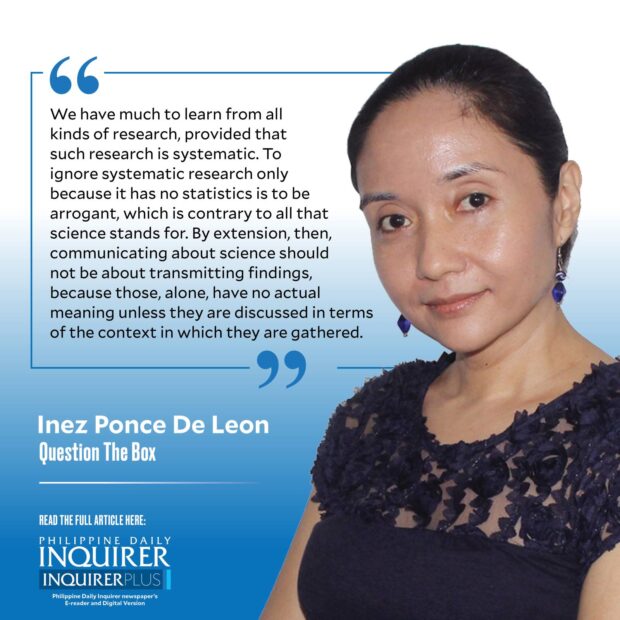A spark of philosophy, a multilayered reality
 Last week, I was at the annual conference of the International Association of Critical Realism, held at the Ateneo. I presented a paper on my work in science communication as practice and philosophy, and served as a panelist on the natural sciences and its intersections with critical realism.
Last week, I was at the annual conference of the International Association of Critical Realism, held at the Ateneo. I presented a paper on my work in science communication as practice and philosophy, and served as a panelist on the natural sciences and its intersections with critical realism.
As a paradigm, critical realism claims that what we observe is only a manifestation of a deeper truth; and we, as scientists, are limited in measuring this truth because of our training, focus, and objectives, among many others.
In this paradigm, scientists have to admit that they are never objective as individuals, not if objectivity is defined as being completely emotionless and value-free. Scientists are humanized: They have their own interests and agenda, and this agenda is not demonized but is, instead, acknowledged as real and influential in the research process. In acknowledging their humanity, scientists should then be humbled in the face of a complex world.
Note the choice of words: Scientists should be humbled, but this does not mean they should feel humiliated.
There is still objectivity in science, for instance, in the ability of scientists to document their work faithfully so that it can be replicated elsewhere. It is definitely not in today’s research process, because scientists themselves can gatekeep who gets to be in their ranks, who gets funding, whose findings matter. Those who can afford to do research and publish their work consequently become more visible. Those who do less cited, but no less rigorous and timely work, are often unjustly ignored.
Critical realism, as a consequence, demands that all forms of knowledge be given due attention and equal standing, without valorizing any knowledge system, including that of Western science.
There was much more that I wanted to say in the panel, where I sat with fellow scholars: Dr. Margaret Blackie, a chemist and chemistry education researcher from Rhodes University; Dr. Robyn Yucel, a sociology of science scholar from Deakin University; and Dr. Ben Vallejo, a marine scientist from University of the Philippines Diliman.One insight that I wish I’d been able to impart, had I been given more time, is the idea that the act of researching is often deemed legitimate only if its findings are widely generalizable, and only if the methods reduce everyday life to isolated variables. Qualitative, in-depth work is looked down on, even if such work attempts to study phenomena in their context, rather than as mere measurements.
We have much to learn from all kinds of research, provided that such research is systematic. To ignore systematic research only because it has no statistics is to be arrogant, which is contrary to all that science stands for.
By extension, then, communicating about science should not be about transmitting findings, because those, alone, have no actual meaning unless they are discussed in terms of the context in which they are gathered, as well as in the context against which they must be understood.
Communicating about such findings might include the story of the scientist who conceptualized the research, how they asked such questions and chose the methods to meet their objectives, how they imagined their work. Facts are important, but they must be woven into a story rather than presented barebones.
And those stories can be compelling. The chemist who lost a parent to cancer and wants to search for a miracle drug to cure the disease. The molecular biologist who sat with a family that starved through a drought and wants to create rice that can survive even in low water conditions. The physicist who was fascinated with planes as a child and wants to design more aerodynamic aircraft.
The bench sciences don’t have a monopoly on science. There, too, is the sociologist who might have worked for years to answer questions about indigenous communities whose knowledge about watersheds has long been ignored. The psychologist who discovered their field after years of going from one career to the next. The communication scholar who finds new constructs of our ever-changing reality in their research on social media discussions around current issues.
Science communication is often burdened—and wrongly—with the singular goal of educating a nebulous lay public assumed to be ignorant and in need only of science to make decisions. Yet it is these stories that give life to what we misunderstand to be a sterile, only-for-smart-people field. It is these stories that bring science to life—but it is also these stories that tell us that science is only one way of knowing an incredibly complex and multilayered world.
Ignoring these stories or wishing them away will turn science into a pathetic field that caters to no one but ideology.
iponcedeleon@ateneo.edu




















